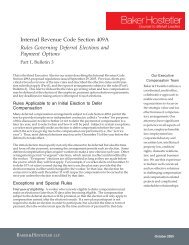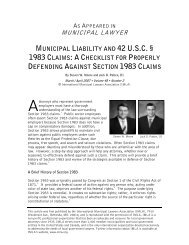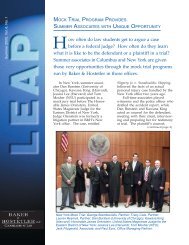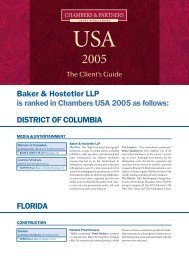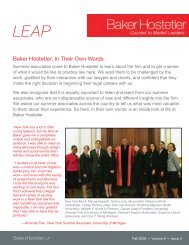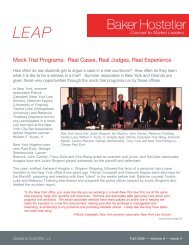Prejudgment Remedies in Texas - Doug D'Arche - Back to Main Page
Prejudgment Remedies in Texas - Doug D'Arche - Back to Main Page
Prejudgment Remedies in Texas - Doug D'Arche - Back to Main Page
- No tags were found...
You also want an ePaper? Increase the reach of your titles
YUMPU automatically turns print PDFs into web optimized ePapers that Google loves.
c. Replevy by the Deb<strong>to</strong>rThe Deb<strong>to</strong>r may defeat the Writ of Sequestration by fil<strong>in</strong>g its own Replevy Bond.Commercial Securities Co. v. Thompson, 239 S.W.2d 911, 914 (Tex. Civ. App.—Fort Worth1951, no writ). A Replevy Bond may be filed anytime before judgment if the property has notbeen previously claimed, replevied or sold. Tex. R. Civ. P. 701. The Deb<strong>to</strong>r must give a bond,with sufficient surety or sureties, as provided by statute, <strong>to</strong> be approved by the clerk, payable <strong>to</strong>the Credi<strong>to</strong>r, <strong>in</strong> an amount fixed by the Court's Order. Id. Either party shall have a right <strong>to</strong> havethe amount of the bond <strong>in</strong>creased or decreased. Id. The purpose of the Deb<strong>to</strong>r's Replevy Bondis <strong>to</strong> ensure that the property will be forthcom<strong>in</strong>g after judgment <strong>in</strong> the same condition as whenreplevied. Commercial Securities Co. v. Thompson, 239 S.W.2d 911, 914 (Tex. Civ. App.—FortWorth 1951, no writ). If the property seized is personal property, then the bond shall requirethat the Deb<strong>to</strong>r not remove the property out of the county or that it will not waste, ill-treat, <strong>in</strong>jure,destroy, or dispose of the property, and that the Deb<strong>to</strong>r will have such property, <strong>in</strong> the samecondition as when it as replevied, <strong>to</strong>gether with the value of the fruits, hire or revenue thereof, <strong>to</strong>abide by the decision of the Court or that the Deb<strong>to</strong>r will pay the value thereof, or the differencebetween the value at the time of the replevy and the time of judgment and of the fruits, hire orrevenue of the same, if ordered <strong>to</strong> do so. Tex. R. Civ. P. 702. The word<strong>in</strong>g of this rule requir<strong>in</strong>gthat the Deb<strong>to</strong>r have the property <strong>in</strong> the same condition as when it was replevied, excludes anyord<strong>in</strong>ary depreciation <strong>in</strong> market value. Associates Inv. Co. v. Soltes, 250 S.W.2d 593, 595 (Tex.Civ. App.—Dallas 1952, writ ref'd n.r.e.). The language that the Deb<strong>to</strong>r will pay the differencebetween the value at the time of replevy and at the time of judgment refers <strong>to</strong> damagesoccasioned by the ord<strong>in</strong>ary use. Id. If the property is real estate, the bond shall require that theDeb<strong>to</strong>r not <strong>in</strong>jure the property and that the Deb<strong>to</strong>r will pay the value of the rents of the same, ifhe is ordered <strong>to</strong> do so. Tex. R. Civ. P. 703.If the Deb<strong>to</strong>r has filed a Replevy Bond, the Order dissolv<strong>in</strong>g the Writ vacates theReplevy Bond and discharges the sureties. Tex. R. Civ. P. 172a.If the levy<strong>in</strong>g officer receives notice of fil<strong>in</strong>g of a Replevy Bond with<strong>in</strong> 10 days after thelevy, and the Credi<strong>to</strong>r does not timely object <strong>to</strong> the bond, the officer must re-deliver the property<strong>to</strong> the Deb<strong>to</strong>r upon receipt of the fees and necessary expenses for safeguard<strong>in</strong>g the property,<strong>in</strong>clud<strong>in</strong>g pick up and s<strong>to</strong>rage costs. Tex. R. Civ. P. 708.There is a conflict <strong>in</strong> the law as <strong>to</strong> whether or not a Deb<strong>to</strong>r who replevies may be liablefor the fruits, hire or revenue of the property. Civ. Prac. & Rem. Code § 62.046 provides that aDeb<strong>to</strong>r who replevies the property is not required <strong>to</strong> account for the fruits, hire, revenue, or ren<strong>to</strong>f the property. However, Tex. R. Civ. P. 702 provides that the Replevy Bond be <strong>in</strong> an amountthat <strong>in</strong>cludes the value of the fruits, hire or revenue thereof. Currently there is no case lawresolv<strong>in</strong>g this conflict.11. Replevy by the Credi<strong>to</strong>rIf the Deb<strong>to</strong>r has not replevied the property with<strong>in</strong> 10 days after execution of the Writ ofSequestration and service of notice on the Deb<strong>to</strong>r, a Credi<strong>to</strong>r may file a Replevy Bond <strong>in</strong> anamount fixed by the Court's Order. Tex. R. Civ. P. 708. Upon fil<strong>in</strong>g of the bond, the officer mustgive possession of the property <strong>to</strong> the Credi<strong>to</strong>r. Id. For personal property, the bond mustrequire that the Credi<strong>to</strong>r have the property, <strong>in</strong> the same condition as when it was replevied,<strong>to</strong>gether with the value of the fruits, hire, or revenue thereof, forthcom<strong>in</strong>g <strong>to</strong> abide the decisionof the Court, or that it will pay the value thereof, or the difference between its value at the time ofreplevy and at the time of judgment (regardless of the cause of such difference <strong>in</strong> value, and ofthe fruits, hire or revenue of the same <strong>in</strong> case it should be ordered <strong>to</strong> do so). Id. For real<strong>Page</strong> 22 of 36



